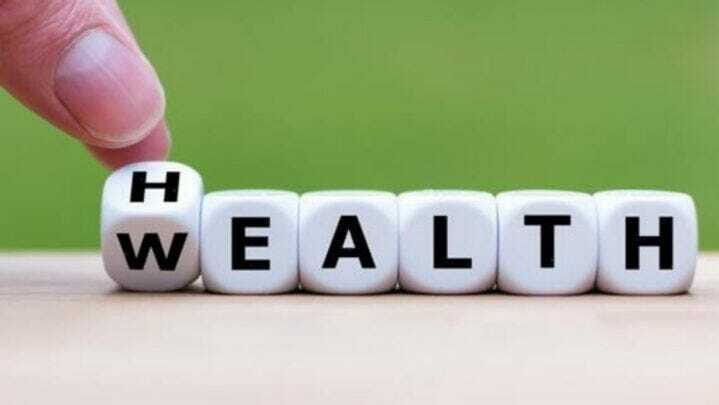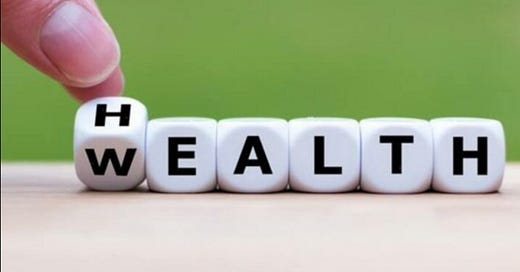Health is Wealth
More than just a popular Pinterest line, your health is infinitely more valuable than your finances.
Hello friends, and welcome to Young Money! If you want to join hundreds of other readers in learning about finances, career navigation, and figuring this life thing out, subscribe below:
You can check out my other articles and follow me on Twitter too!

A Billionaire’s Folly
John Davison Rockefeller Senior was the richest American to ever live. At its peak, his fortune was worth almost $300 billion in 2021 dollars. Rockefeller built one of the US’s first true monopolies, Standard Oil, and he reaped the benefits of controlling the energy market of the world’s fastest growing economy at the turn of the 20th century. While he made kerosene an affordable product for the average American household, Rockefeller drew the ire of the government, media, and countless pundits in the oil market due to his actions as a business magnate.
As pressure against his business grew, Rockefeller began experiencing all sorts of health problems. Rockefeller had been a relatively healthy 50-year old man, but his body started deteriorating as a result of the stress. He fell into depression. He had digestive problems. He developed alopecia, the loss of hair across one’s body.
Rockefeller could purchase a nation, but he couldn’t cure his digestive issues. He had lavish homes across the country, but he couldn’t stop the hair loss that plagued him. JD Rockefeller could buy the world, but he couldn’t save himself.
The government eventually broke up the Standard Oil monopoly, and Rockefeller’s health improved after he took a hands-off approach to his businesses. That being said, the question remains: What good was a billion dollars when his health had failed?
Overview
We spend a lot of time learning how to save and invest our money, but none of it matters if we aren’t healthy enough to reap the rewards. I previously wrote about how Time Isn’t Money. I discussed money’s diminishing marginal utility, and I explained that the real key is figuring out how much time you are willing to trade for your income.
Well there’s another side to that coin. Obviously we want to make more money, but we can take an active role in expanding our time as well. How? Taking care of your health. Healthier people live longer. Healthier people have the energy and stamina to get out and experience the world. Healthier people have the most opportunities to take advantage of their finances. This isn’t a letter about stocks; it’s much more important.
Think about the Rockefeller story. JD Rockefeller was the richest American to ever live, and he almost died from avoidable health issues. When the government and media turned against Standard Oil, stress caused the billionaire’s health to deteriorate. When his stress peaked, the oil magnate came quite close to death. Even after recovering from many of his conditions, Rockefeller’s hair never fully returned.
Imagine spending your life building a multibillion dollar fortune, but your health had declined to the point that you could hardly enjoy it.
You want to see your financial journey derailed? Experience a medical disaster. While some health problems are, unfortunately, inevitable, many are entirely avoidable (or at least manageable). The old adage, “An ounce of prevention is worth a pound of cure" certainly rings true here.
What Can We Control?
A tweet from Patrick O’Shaughnessy caught my eye yesterday, and this actually inspired me to write this article.
America has an obesity problem. 40% of the country is obese. That’s nuts. You don’t hear about that much anymore, as comments on weight are somewhat taboo. The data doesn’t lie though. Surprisingly, carb and sugar intake have dropped over the last 30 years while obesity rates steadily ticked up. Sedentary lifestyles, increased caloric intake, and increased consumption of processed foods likely play a large role in this obesity epidemic. After all, when you sit at a desk for 9 hours, eat the quickest option available, and skip out on the gym, what do you expect?
There’s a million articles, videos, documentaries, etc. about the best diet for your body type. The most effective exercises for men in their 40s. Distance running is the best. Sprinting is the best. Low carbs are key. Cut out red meats.
It’s easy to get lost in the sauce, so I’m going to keep this simple: exercise regularly and cut back on the processed foods. Those are two of the easiest changes that we can make, but they will pay dividends over time.
Exercise
According to Harvard researchers, regular exercise has been proven to greatly reduce the risk of diabetes, heart disease, and cancer, while strengthening your bones and improving your mood. Harvard also calculated that 10% of premature deaths and $117B in healthcare costs can be attributed to inadequate physical activity. Even so, only 1/5 of all teenagers and adults get adequate exercise. My best investment tip? Invest at least 150 minutes in aerobic exercise and twice weekly resistance workouts.
Diet
The graphs referenced above highlight an obvious point: our diets are terrible. We eat too much, too processed. In a world that is constantly moving, we have optimized for efficiency over healthiness. High fructose corn syrup, preservatives, and all sorts of strange chemicals and additives pollute most of our diets. Cut out the crap, and I promise that you will begin to feel better.
Good Health = More Money Now
Why does it matter?
Health issues are expensive. The American Diabetes Association (ADA) estimates that diabetics spend 2.3x as much, or $16,752, on medical expenditures as the average American. Insulin, doctors appointments, and increased insurance costs all come in to play. These stats are mirrored across a variety of chronic conditions. Say $5,000 is paid out of your pocket. Under normal circumstances, you would cut an avoidable $5,000 expense immediately. That is money that can go towards experiences with friends and family. Vacations. Sporting events. Anything. Why should medical expenses be any different? Staying healthy is a budgeting pro-tip that no one talks about.
Good Health = More Time & Energy Later
My high school basketball coach, Dan Henderson is a badass.

He spent several years in the Air Force before pursuing a coaching career. He could bench press more at 69 years old (280 lbs) than I could at 17. Six years after I graduated high school, he is still coaching into his 70s. Coach Henderson is a prime example of why you want to pursue an active lifestyle for the long-term.
I have previously talked about how investments compound over time, and this same dynamic applies to our health. Entropy sucks, and it only gets worse over time. That being said, we can fight it by starting and maintaining an active lifestyle early on. Most people in their 70s struggle to get around without help, while Coach Henderson jogs several miles and works out every day. He still gets out on the court and shoots around with players.
If you invest consistently over the next 40-50 years. You will be a millionaire once you reach retirement age. What good are those millions if you can’t do anything with them? Investing is a slow-tedious process for a while, but the returns tend to accelerate once you reach a certain point.
Healthy living works similarly. An active lifestyle may not feel like much at 24, but it makes all the difference once you are 64.
Half of personal finance is making the money you need to live the lifestyle that you desire. The other half is making sure you actually have the means to live it out. Financial health is important, but it’s useless if you haven’t taken care of your physical health along the way.
That’s all for today! Hope everyone has a great Thursday, and remember that NFL football is back 😤
Jack
If you liked this piece, make sure to subscribe by adding your email below!




